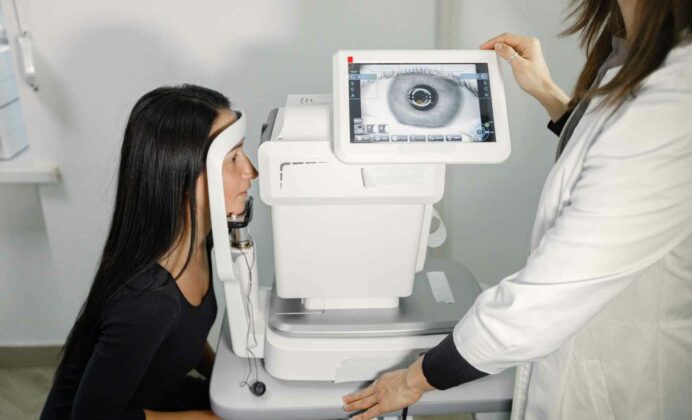Did you know that PCOS isn’t just about irregular periods or hormonal imbalances? It can also affect your eyes. Yes, that’s right – your eyes. Polycystic Ovary Syndrome (PCOS) is more common than you might think, impacting millions of women all around the world. But not many know about how it can play a role in their eye health. In this blog, we’re going to dive into the less-talked-about side of PCOS and eye problems.
From dry eyes to blurry vision, we’ll explore how this hormonal disorder during PCOS can lead to eye problems. And most importantly, we’ll share some practical tips on what you can do to take care of your eyes if you’re dealing with PCOS.
So, if you’re one of the many women navigating life with PCOS, this blog is especially for you. Get ready to learn more about keeping your eyes healthy while managing PCOS. Let’s jump right in!
Contents
PCOS: A Quick Overview
 Before delving into the eye-related issues associated with PCOS directly, let’s briefly understand what PCOS is.
Before delving into the eye-related issues associated with PCOS directly, let’s briefly understand what PCOS is.
What is PCOS? Polycystic Ovary Syndrome (PCOS) is a hormonal disorder that primarily affects women in their reproductive years. It’s characterized by:
- Hormonal Imbalance: Especially an excess of androgens (male hormones).
- Symptoms: These include irregular periods, ovarian cysts, and difficulties with conceiving.
- Associated Risks: Insulin resistance, weight gain, and increased risks of diabetes and heart disease.
While there’s no cure for PCOS, its symptoms can be managed effectively:
- Lifestyle Modifications: A balanced diet, regular exercise, and weight management are key.
- Medications: Birth control pills, anti-androgens, or metformin may be prescribed to regulate menstrual cycles and control symptoms.
- Fertility Treatments: For those trying to conceive, fertility medications or assisted reproductive technologies may be used.
Your Go-To Resource: HerMantra
If you’re dealing with PCOS, HerMantra is here to help. As a dedicated women’s health platform, we offer:
- Specialized Online Treatment: Tailored to your unique needs.
- Comprehensive Care and Support: From information and guidance to expert care, HerMantra is your resource for managing PCOS effectively.
Join us at HerMantra, where we’re committed to supporting your journey with PCOS, providing the care, guidance, or specialized online PCOS treatment and attention you deserve to navigate the complexities of PCOS and well-being.
Is There A Link Between PCOS And Eye Health?
When we talk about Polycystic Ovary Syndrome (PCOS), its impact on reproductive health often takes the spotlight. However, it’s crucial to recognize that PCOS can also have implications for other aspects of health, including your eyes. While research directly linking PCOS to specific eye problems is still evolving, there are several indirect associations and potential risk factors that are important to consider.
The Indirect Impact of Hormonal Imbalances:

- Fluctuating Hormone Levels: These can affect the tear film in your eyes, potentially leading to dry eye syndrome, a common issue for those with PCOS. Symptoms of dry eyes include irritation, redness, and a feeling of dryness or discomfort in the eyes.
- Insulin Resistance: Many with PCOS experience insulin resistance, which can indirectly affect eye health. Over time, high blood sugar levels can damage blood vessels in the eyes, leading to conditions like diabetic retinopathy.
- Inflammation: PCOS often comes with chronic inflammation, which could potentially contribute to conditions like uveitis (inflammation of the middle layer of the eye).
Common Eye Problems Associated With PCOS

Now, that we know PCOS can have an indirect effect on eye health, let’s discuss the various issues in some detail. Here are some eye problems that arise due to PCOS:
- Dry Eye Syndrome
This is one of the most frequently reported eye issues in those with PCOS. Hormonal imbalances can affect the tear film’s stability, leading to dry, irritated, or gritty-feeling eyes. - Changes in Vision
Fluctuating hormones can sometimes cause vision changes. You might notice that your eyesight is not as sharp as usual, or you may experience difficulties focusing. - Increased Risk of Certain Eye Diseases
Some studies suggest that women with PCOS might be at a higher risk of developing certain eye conditions, such as glaucoma or diabetic retinopathy, especially if PCOS is coupled with other risk factors like obesity or diabetes. - Retinal Changes
Insulin resistance, a common issue in PCOS, can sometimes lead to changes in the blood vessels of the retina, potentially impacting vision. - Swelling Around the Eyes
PCOS can sometimes cause swelling or puffiness around the eyes, which may be linked to hormonal changes or associated conditions like insulin resistance. - Migraines and Visual Disturbances
Some women with PCOS experience migraines, which can include visual disturbances like auras or flashes of light. These visual symptoms can be disconcerting and may affect vision temporarily. - Increased Risk of Diabetic Retinopathy
Diabetic Retinopathy is a serious consequence of type 2 diabetes. It occurs when high levels of blood glucose damage the blood vessels in the retina causing various vision problems.
If you’re experiencing any of these eye issues and have PCOS, it’s important to address these symptoms with your healthcare provider. While not all eye problems are directly caused by PCOS, the association between the two warrants attention.
Can PCOS Cause Blurry Vision?
A question that often comes up for those living with Polycystic Ovary Syndrome (PCOS) is whether it can cause blurry vision.
So, blurry vision in individuals with PCOS can be attributed to several factors:
- Hormonal Fluctuations can temporarily alter the shape and thickness of the cornea, leading to changes in vision, including blurriness.
- Many individuals with PCOS also experience insulin resistance. This condition can affect blood vessels throughout the body, including those in the eyes, potentially leading to changes in vision.
- Women with PCOS are at a higher risk for conditions like diabetes, which can lead to diabetic retinopathy – a condition that affects the blood vessels in the retina and can cause blurry vision.
- As mentioned earlier, dry eye syndrome is common in PCOS and can contribute to blurry vision. When the eyes are not adequately lubricated, it can lead to intermittent blurriness.
It’s important to note that not everyone with PCOS will experience blurry vision, and there can be other causes for this symptom. However, if you have PCOS and are noticing changes in your vision, it’s advisable to consult with an eye care professional.
Managing Eye Problems in PCOS: Tips and Treatments

Dealing with eye problems when you have Polycystic Ovary Syndrome (PCOS) might seem daunting, but there are several effective ways to manage and treat these issues.
- Regular Eye Exams: These exams can help identify any changes in your eye health early on, allowing for timely intervention.
- Manage Dry Eyes: For dry eye syndrome, artificial tears or lubricating eye drops can provide relief.
Also, staying hydrated and reducing screen time can help.
In more severe cases, your eye doctor might recommend treatments like punctal plugs that help retain moisture. - Control Blood Sugar Levels: If you have insulin resistance or diabetes along with PCOS, managing your blood sugar levels is vital. Keeping blood sugar levels in check can prevent or delay the onset of diabetic retinopathy, which can cause vision impairment.
- Healthy Lifestyle Choices: A balanced diet rich in nutrients, regular exercise, and maintaining a healthy weight can positively impact overall health and, consequently, eye health.
- Omega-3 Fatty Acids: Incorporating foods high in Omega-3 fatty acids, like fish, flaxseeds, and walnuts, or taking supplements can help improve tear quality and relieve symptoms of dry eyes.
- Protect Your Eyes: Wearing sunglasses to protect your eyes from harmful UV rays and avoiding smoking can also contribute to better eye health.
- Medication Adjustments: If you’re experiencing significant eye issues, discuss with your doctor whether any of your current medications could be contributing factors, and if adjustments are needed.
- Stress Management: Since stress can exacerbate PCOS symptoms, finding effective ways to manage stress can indirectly help with managing eye health issues.
Remember, every individual with PCOS is different, and what works for one person might not work for another. It’s important to work closely with your healthcare providers to find the best treatment plan for your specific needs.
Conclusion
While Polycystic Ovary Syndrome (PCOS) primarily affects the reproductive system, it’s essential to recognize its potential impact on eye health. Regular eye examinations and open communication with both your eye care specialist and healthcare provider are key. These measures can help detect eye issues early and ensure timely intervention when needed. Moreover, managing PCOS through a healthy lifestyle, blood sugar control, and hormone management can positively influence overall well-being, including your eye health.
Remember, your eyes are precious, and their health deserves the same attention as any other aspect of your body. By staying proactive, you can protect your vision and enjoy a brighter, clearer future despite the challenges that PCOS may bring. You can visit PCOSMantra and HerMantra to learn more about PCOS and their possible management methods.
Are your eyes craving attention? It’s time to prioritize your eye health! Book your free appointment now at Best Eye Hospital in India or call us on 9711116605



